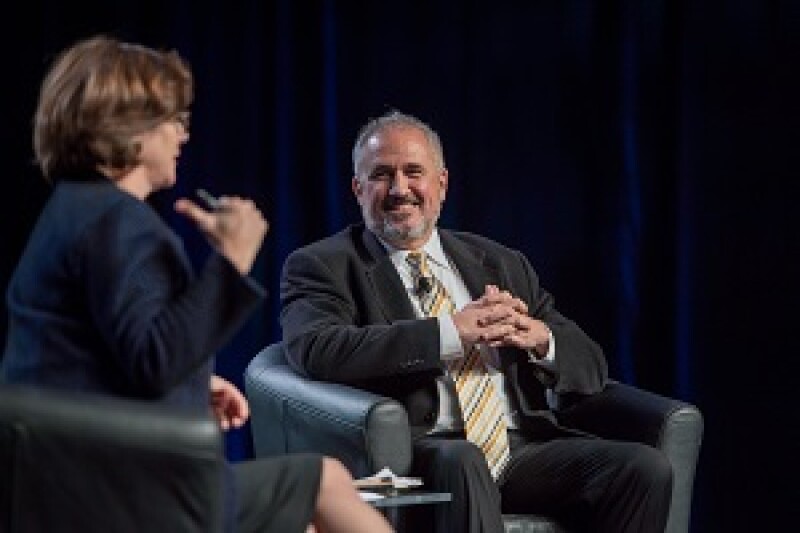
He revealed that the USPTO Director and Deputy Director said his objective was "to make it a grown-up organization." He stressed that, even though AIA trials get most of the attention, two-thirds of the Board's work is still ex parte appeals.
"My job is about organization," he said. "There has always been an appeals division and a trials division. That is changing. I urge all judges to have mixed dockets. The biggest challenge is to get the Board in that mindset."
The Board stopped hiring judges a year ago. AIPLA President Denise DeFranco asked Ruschke how the Board can ensure consistency. "I get that question a lot," he said. "We have 272 judges versus 12 Federal Circuit judges and they get consistency questions too, so bear that in mind!"
New judges are put exclusively on ex parte appeals. "They are well skilled and well trained so it is about integrating them," he said. "We have judge mentors so that they can understand the intricacies of procedures." The Board also debriefs all judges on "almost every Federal Circuit case that comes down."
The number of AIA petitions filed so far this year is down compared to last year. "There has been a slight dip," said Ruschke. "I anticipate that is probably going to stabilize."
About one third of petitions end in settlement, which is almost evenly split between pre- and post-institution. "I think that it is a pretty good number. Those settlements pretty much always take the district court out as well, and that's what the AIA was meant to do," said Ruschke.
It has proven difficult to amend claims in PTAB proceedings, with the USPTO releasing a report in May that revealed only 5% of motions to amend reviewed by the Board had been granted or granted in part. Ruschke noted, however, that amending claims is not always desirable. "How many of you in the audience would like to amend claims and give up all damages you have accrued?" he asked. He added that many of the motions to amend on which the Board has ruled simply did not meet patentability requirements. The number of motions to amend has been fairly stable at 50-60 a year, he said.
The PTAB implemented rules changes in May, introducing five main new rules. The most significant of these was the ability to include expert testimony with the patent owner response. "Since May, 40% of patent owners have taken us up on that," Ruschke. "That's positive. It's that fairness we are really trying to strive for. We do hear the criticism out there."
DeFranco asked if any further rule changes were in the pipeline. Ruschke noted the presidential election makes this unlikely for now. "That doesn't mean the Board internally is not talking about things, but this transition will put a wrench in it a bit," he said.
The Board has not designated many of its decisions as precedential so far. Judges can suggest cases they believe should be considered but many people may not know that third parties can as well, within 60 days of a decision being issued. These go through the publications committee and then to a vote of all judges, with a majority needed to approve.
"We are looking at it to see if that is the best way of doing it," Ruschke said. "The need for precedential opinions is very important. I think it is the best way to go and if we are wrong we are wrong, and the Federal Circuit will tell us so."
DeFranco pressed Ruschke on the End-2-End (E2E) electronic filing system launched in July. "My personal experience is that has been really challenging – there have been a lot of glitches," said DeFranco. Ruschke conceded "it was a challenge". He says the PTAB has a list of about 500 issues that have been submitted by users. The Board is also shifting to uploading decisions twice a day, at 11am and 4pm Eastern.
The Board is beginning to have cases remanded back to it from the Federal Circuit, considering about a dozen so far. Unlike the actual trial, there is no statutory deadline for remands. Ruschke says the Board is developing internal guidelines for how it deals with remands. "I'd like to have an informal six-month deadline," he said. "When you don't have a deadline it is very easy to let it creep." He conceded that two of the current remanded cases will not hit that target, however.
Ruschke says the PTAB has an advantage over other countries' post-grant proceedings – they are a lot quicker. "The statutory deadline means we could have the best post grant proceedings in the world," he said.










